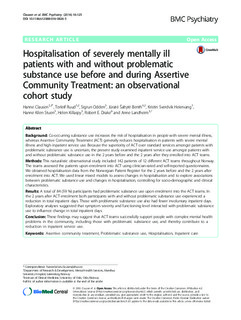| dc.contributor.author | Clausen, H. | |
| dc.contributor.author | Ruud, T. | |
| dc.contributor.author | Odden, S. | |
| dc.contributor.author | Benth, J. Š. | |
| dc.contributor.author | Heiervang, K.S. | |
| dc.contributor.author | Stuen, H.K. | |
| dc.contributor.author | Landheim, A. | |
| dc.date.accessioned | 2018-05-22T12:41:29Z | |
| dc.date.available | 2018-05-22T12:41:29Z | |
| dc.date.issued | 2016 | |
| dc.identifier.citation | Clausen, H., Ruud, T., Odden, S., Benth, J. Š., Heiervang, K. S., Stuen, H. K., . . . Landheim, A. (2016). Hospitalisation of severely mentally ill patients with and without problematic substance use before and during Assertive Community Treatment: an observational cohort study. BMC Psychiatry, 16(125). | nb_NO |
| dc.identifier.uri | http://hdl.handle.net/11250/2498740 | |
| dc.description.abstract | Background
Co-occurring substance use increases the risk of hospitalisation in people with severe mental illness, whereas Assertive Community Treatment (ACT) generally reduces hospitalisation in patients with severe mental illness and high inpatient service use. Because the superiority of ACT over standard services amongst patients with problematic substance use is uncertain, the present study examined inpatient service use amongst patients with and without problematic substance use in the 2 years before and the 2 years after they enrolled into ACT teams.
Methods
This naturalistic observational study included 142 patients of 12 different ACT teams throughout Norway. The teams assessed the patients upon enrolment into ACT using clinician-rated and self-reported questionnaires. We obtained hospitalisation data from the Norwegian Patient Register for the 2 years before and the 2 years after enrolment into ACT. We used linear mixed models to assess changes in hospitalisation and to explore associations between problematic substance use and changes in hospitalisation, controlling for socio-demographic and clinical characteristics.
Results
A total of 84 (59 %) participants had problematic substance use upon enrolment into the ACT teams. In the 2 years after ACT enrolment both participants with and without problematic substance use experienced a reduction in total inpatient days. Those with problematic substance use also had fewer involuntary inpatient days. Exploratory analyses suggested that symptom severity and functioning level interacted with problematic substance use to influence change in total inpatient days.
Conclusion
These findings may suggest that ACT teams successfully support people with complex mental health problems in the community, including those with problematic substance use, and thereby contribute to a reduction in inpatient service use. | nb_NO |
| dc.publisher | BMC Psychiatry | nb_NO |
| dc.rights | Navngivelse 4.0 Internasjonal | * |
| dc.rights.uri | http://creativecommons.org/licenses/by/4.0/deed.no | * |
| dc.subject | assertive community treatment | nb_NO |
| dc.subject | problematic substance use | nb_NO |
| dc.subject | hospitalisation | nb_NO |
| dc.subject | inpatient care | nb_NO |
| dc.subject | pasientforløp | nb_NO |
| dc.title | Hospitalisation of severely mentally ill patients with and without problematic substance use before and during Assertive Community Treatment: an observational cohort study | nb_NO |
| dc.type | Journal article | nb_NO |
| dc.source.volume | 16 | nb_NO |
| dc.source.journal | BMC Psychiatry | nb_NO |
| dc.source.issue | 125 | nb_NO |
| dc.identifier.doi | 10.1186/s12888-016-0826-5 | |

